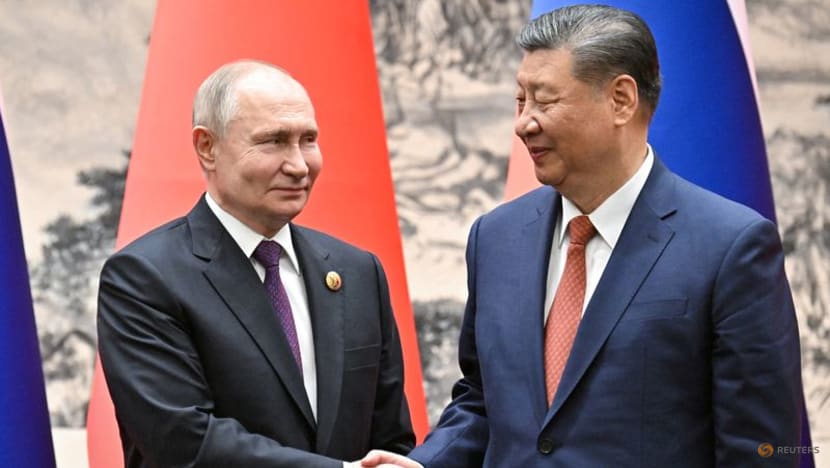Commentary: Will the Xi Jinping and Vladimir Putin bromance last?
China-Russia ties continue to flourish under Presidents Xi Jinping and Vladimir Putin. The Ukraine war and the upcoming US presidential election won’t change that, says Benjamin Ho from the S Rajaratnam School of International Studies.


This audio is generated by an AI tool.
SINGAPORE: The bromance between Chinese President Xi Jinping and Russian counterpart Vladimir Putin seems to be still going strong. The two leaders have met more than 40 times, including virtually, over the past decade.
They added to that count last week with Mr Putin’s two-day state visit to China, with a pledge of a “new era” in China-Russia relations. But make no mistake: This is not a marriage of convenience.
While the current goodwill is largely due to their strong personal bond, this is undergirded by their shared worldview about the need for authoritarian, strongman leadership. Given their one-year age difference, Mr Xi and Mr Putin were likely marked by the same global events, including the fall of the Soviet Union and the purported “victory of the West”.
Consequently, the economic crises faced by the United States and the long, drawn-out war on terror would also have framed both leaders’ calculations about the sustainability of Western global leadership - and importantly, whether their countries are entitled to have a greater say and share of the making of global norms and international rules.
As the Financial Times’ Gideon Rachman put it, Russia and China believe “the decline of US global power is necessary and inevitable”. A multipolar world would “allow different civilisations to live by their own rules”.
For Beijing and Moscow, living by their own rules would presumably include governing their domestic constituents in a manner they deem appropriate - not what Washington prefers.
CHINA AS PEACEMAKER?
Given the state of the bromance, there is a widely-held belief that China is best poised to possibly broker peace in the Ukraine war. Hopes of some kind of diplomatic truce, under Beijing’s stewardship, between Kyiv and Moscow in the coming months persist, with Mr Putin praising China’s peace plan ahead of his visit.
However, this is very unlikely to happen.
First, Beijing sees this conflict as one waged as a result of Western belligerence - from the expansion of the North Atlantic Treaty Organization (NATO) to America fanning the flames with the continued provision of aid and arms - and that any cessation of hostilities ought to be the initiative of the West, not China.
Second, the Ukraine conflict distracts the United States from Asia, thus proffering Beijing more breathing space and autonomy to act on its interests in the Asia-Pacific.
Third, as a result of Western sanctions, Moscow has been reliant on China to keep its economy going. In April, China imported 9.26 million metric tons of oil from Russia, up from 5.41 million metric tons in February 2022, a 72 per cent increase. The ability to procure cheap oil from Moscow is crucial for Beijing given its own sky-rocketing energy needs over the years.
Finally, the war serves as a testbed for China to assess Western solidarity and cohesiveness in the event of a Taiwan contingency. While the diplomatic line is that the political conditions of Kyiv and Taipei are separate matters and cannot be conflated, the practice and conduct of warfare are not.
Political leaders and military planners worldwide are using the Ukraine example to finetune and clarify their operating assumptions and warfare strategies - one cannot imagine Beijing not doing so. That said, insofar as the conflict does not somehow spill over into Chinese borders, China is likely to be content as a passive spectator and would not proactively muddy its hands.
US PRESIDENTIAL ELECTION, EUROPEAN COURTSHIP
That is not to say Mr Xi and Mr Putin do not have their differences.
The United States presidential election in November could be a gamechanger for the Ukraine war: A win for incumbent President Joe Biden would likely ensure continuity in Washington’s support. A Donald Trump victory would complicate the equation, given the former president’s somewhat ambivalent position on the war and his personal history of ties with Mr Putin.
Many European countries are understandably worried that Mr Putin’s territorial ambitions would go unchecked should American support for Ukraine waver. His invasion disrupted the European security order and Mr Putin has not shied away from antagonising them.
Unsurprisingly, China has been trying to court the European Union. Mr Xi made his first Europe trip in five years, with state visits to France, Serbia and Hungary. The latter two countries are part of Mr Xi’s signature Belt and Road Initiative infrastructure plan.
Cultivating European ties is a timely endeavour: The US-China trade war is unlikely to change course - no matter the outcome of the presidential election. And while Europe surely does not approve of China’s close ties with Russia, its ambitions for more strategic autonomy and less dependence on the US keep the door open.
In the event of an American withdrawal of support to the region, Beijing could create more diplomatic space for itself and have more fodder to sell its vision for a more multipolar world.
So long as Mr Xi and Mr Putin remain in power, the China-Russia bromance will continue. For both men, there are no better alternatives.
Benjamin Ho is an assistant professor in the China Programme, Institute of Defence and Strategic Studies, S Rajaratnam School of International Studies. He specialises in the study of Chinese foreign policy, international politics and comparative international order.
















